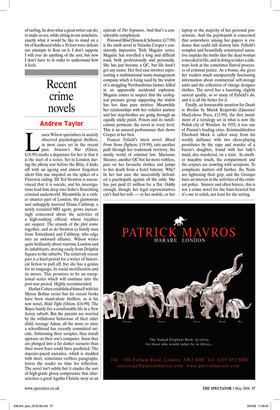Recent crime novels
Andrew Taylor
Laura Wilson specialises in acutely observed psychological thrillers, in most cases set in the recent past. Stratton’s War (Orion, £18.99) marks a departure for her in that it is the start of a series. Set in London during the phony war before the Blitz, it kicks off with an ageing and almost forgotten silent film star impaled on the spikes of a Fitzrovia railing. DI Ted Stratton is unconvinced that it is suicide, and his investigations lead him deep into Soho’s flourishing criminal underworld. Meanwhile in a rather smarter part of London, the glamorous and unhappily married Diana Calthrop, a newly recruited MI5 agent, grows increasingly concerned about the activities of a high-ranking official, whose loyalties are suspect. The strands of the plot come together, and so do Stratton (a family man from Tottenham) and Calthrop, who edge into an awkward alliance. Wilson writes quite brilliantly about wartime London and its inhabitants, moving easily from Dolphin Square to the suburbs. The relatively recent past is a hard period for a writer of historical fiction to pull off, but she has a genius for its language, its social stratification and its mores. This promises to be an exceptional series which will continue into the post-war period. Highly recommended.
Harlan Coben established himself with his Myron Bolitar series but his recent books have been stand-alone thrillers, as is his new novel, Hold Tight (Orion, £18.99). The Bayes family live a comfortable life in a New Jersey suburb. But the parents are worried by the withdrawn behaviour of their elder child, teenage Adam, all the more so since a schoolfriend has recently committed suicide. Jettisoning their scruples, they install spyware on their son’s computer. Soon they are plunged into a far darker scenario than their worst fears could have predicted. The staccato-paced narrative, which is studded with short, sometimes verbless paragraphs, leaves the reader no time for reflection. The novel isn’t subtle but it exudes the sort of high-grade glossy competence that characterises a good Agatha Christie story or an episode of The Sopranos. And that’s a considerable compliment.
Poisoned Mind (Simon & Schuster, £17.99) is the ninth novel in Natasha Cooper’s consistently impressive Trish Maguire series. Maguire has travelled a long and difficult road, both professionally and personally. She has just become a QC, but life hasn’t got any easier. Her first case involves representing a multinational waste-management company which is being sued by the widow of a struggling Northumbrian farmer, killed in an apparently accidental explosion. Maguire comes to suspect that the ecological pressure group supporting the widow has less than pure motives. Meanwhile her relationships with her solicitor partner and her step-brother are going through an equally sticky patch. Poison and its ramifications permeate the novel at every level. This is an assured performance that shows Cooper at her best.
Frances Fyfield’s latest novel, Blood From Stone (Sphere, £19.99), cuts another path through her trademark territory, the murky world of criminal law. Marianne Shearer, another QC but far more ruthless, puts on her favourite clothes and jumps to her death from a hotel balcony. Why? In her last case she successfully defended a psychopath against all the odds. She has just paid £1 million for a flat. Oddly enough, though, her legal representatives can’t find her will -— or her mobile, or her laptop or the majority of her personal possessions. And the psychopath is concerned that somewhere among her papers is evidence that could still destroy him. Fyfield’s complex and beautifully constructed narrative unpicks the truths that the dead woman concealed in life, and in doing so takes a sideways look at the sometimes flawed processes of criminal justice. As a bonus, she gives her readers much unexpectedly fascinating information about commercial self-storage units and the collection of vintage designer clothes. The novel has a haunting, slightly surreal quality, as so many of Fyfield’s do, and it is all the better for it.
Finally, an honourable mention for Death in Breslau by Marek Krajewski (Quercus/ MacLehose Press, £15.99), the first instalment of a tetralogy set in what is now the Polish city of Wroclaw. In 1933, it was one of Prussia’s leading cities. Kriminaldirektor Eberhard Mock is called away from his weekly dalliance with two chess-playing prostitutes by the rape and murder of a baron’s daughter, found with her lady’s maid, also murdered, on a train. In another macabre touch, the compartment and the corpses are crawling with scorpions. To complicate matters still further, the Nazis are tightening their grip, and the Gestapo have an interest in the activities of the criminal police. Sinister and often bizarre, this is not a crime novel for the faint-hearted but it’s one to relish, not least for the setting.


















































































 Previous page
Previous page